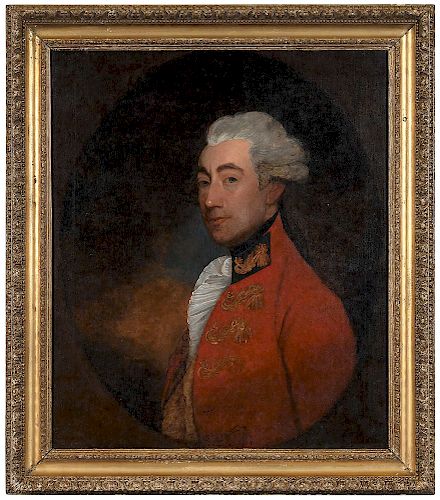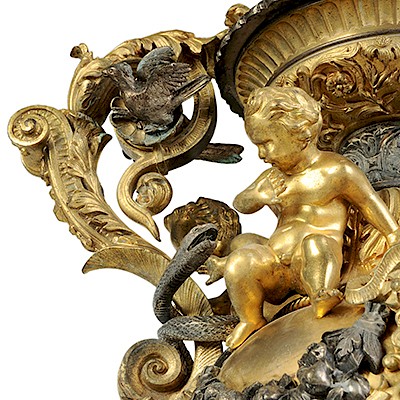Gilbert Stuart
About Seller
PO Box 2135
Asheville, NC 28802
United States
Based in Asheville, North Carolina, Brunk Auctions has been conducting sales of fine and decorative arts for over 30 years. Auctions are held in our North Carolina sale room but attracts a global audience. Founded by Robert Brunk in 1983, the auctions became well known for their integrity and profes...Read more
Two ways to bid:
- Leave a max absentee bid and the platform will bid on your behalf up to your maximum bid during the live auction.
- Bid live during the auction and your bids will be submitted real-time to the auctioneer.
Bid Increments
| Price | Bid Increment |
|---|---|
| $0 | $25 |
| $100 | $50 |
| $1,000 | $100 |
| $2,000 | $200 |
| $3,000 | $250 |
| $5,000 | $500 |
| $10,000 | $1,000 |
| $20,000 | $2,000 |
| $50,000 | $5,000 |
| $100,000 | $10,000 |
About Auction
Sep 15, 2018
Session III Saturday, September 15, Auction begins 9:00 am - lots 816-1416 Brunk Auctions support@brunkauctions.com
- Lot Description
(Massachusetts/Rhode Island/England, 1755–1828)
Francis, Lord Rawdon-Hastings, circa 1786, (Park 552), unsigned, oil on canvas, 29-7/8 x 25-1/4 in.; original 18th century British carved and gilt wood frame, 36-1/4 x 31-1/2 in.
Notes:
As a young 19 year old lieutenant, Francis, Lord Rawdon, embarked in 1774 with his regiment for America, where he was to serve for the next seven years as one of the most active and gallant figures in the American War of Independence. He was present at Lexington and Concord, and was wounded at Bunker Hill. Having established a reputation for courage and leadership he became a protégé of General Sir Henry Clinton, serving as his Aide-de-Camp at the first assault on Charleston and the New York and Rhode Island campaigns of 1776. After a brief visit with Clinton to England in 1777 they returned in time for the actions in the Hudson Highlands. In 1778 Lord Rawdon raised in Philadelphia at his own expense an American Loyalist regiment called the Volunteers of Ireland. After serving on Clinton’s staff at the Battle of Monmouth he led his regiment in the raid on Staten Island in January 1780.
Lord Rawdon then sailed south with reinforcements to join the Siege of Charleston in April 1780. He commanded the British left wing at the Battle of Camden (August 16, 1780) and when Lord Cornwallis went into Virginia, he left Rawdon in effective command in the South. At the young age of 26, Lord Rawdon led a brilliant campaign in in the Carolinas during the most active part of the Southern campaign. In April 1781 he defeated a much larger force of Americans under General Greene at the Battle of Hobkirk’s Hill but after successfully relieving the Siege of Fort Ninety-Six, he was obliged to retreat to Charleston. Worn out by six years of hard campaigning, Lord Rawdon embarked for England in July 1781 only to be captured by a French privateer. During his brief captivity he met Lafayette and Admiral de Grasse, but was soon exchanged and made his way to London, where he was celebrated as one of the most dashing and enterprising commanders in the War.
He was made Aide-de-Camp to the King in 1782 and Major General in 1793, and led a brief but brilliant campaign against the French Revolutionary forces in 1794-5. Siding with the Whigs in Parliament, he supported Catholic Emancipation and nearly became Prime Minister both in 1797 and 1812. Notoriously generous, he left signed chequebooks in the rooms of French refugees staying at his country house Donington Hall, but his close friendship with the Prince of Wales nearly bankrupted his considerable fortune. He succeeded his father as Earl of Moira in 1793 and was made a Knight of the Garter in 1812. His service in India from 1813 to 1823 as Governor General was marked by diplomatic success as he protected the smaller Indian states and purchased Singapore for the Crown. Despite advancing age he also successfully led his final military campaigns in the Nepalese War of 1813 and the 3rd Mahratta War of 1817, and was rewarded by being raised in the peerage as Marquess of Hastings in 1816. He was made Governor of Malta in 1824 but died at sea on his way home in 1826.
In 1786 Lord Rawdon commissioned Gilbert Stuart to paint his friend the Mohawk chief Thayendanegea (Joseph Brant), who was then visiting London and with whom Rawdon had served at the Battle of Long Island in 1776. It is thought that Lord Rawdon also commissioned from Stuart at that time the portrait presently offered. Rawdon is depicted wearing his dress uniform as Aide de Camp to the King, a position which Rawdon held only from 1782 to 1793. This portrait was a gift to another friend from his American service, Dr. John McNamara Hayes (1750 – 1809), an army Surgeon who had served with Rawdon throughout the Revolution and his French campaign in the 1790’s, and was later Physician to the Prince of Wales, being made a Baronet in 1797. The painting is illustrated in Lawrence Park’s 1926 catalogue raisonné “Gilbert Stuart, An Illustrated Descriptive List of his Work” (pg. 526) as being in the possession of the husband of Hayes’ great granddaughter, by whose grandson’s widow the painting was sold c.1948.In Lawrence Park’s entry for no. 552, Francis Rawdon Hastings, Second Earl of Moira, “He was a son of Sir John and Lady Elizabeth (Hastings) Rawdon. His father was in 1762 created Earl of Moira, and in 1793 the son succeeded as second Earl. He served, as Lord Rawdon, during the American Revolution, from 1773 to 1782, and took part in the battles of Bunker Hill, Monmouth and Camden, and during the siege of Charleston. From 1812 to 1822 he was Governor-General of India; from 1824 to 1826 was Governer of Malta; and in 1816 was created Marquess of Hastings. He married in 1804 Flora Muir Campbell (d.1840), Countess of Loudoun in her own right. His title expired in 1868 with he death of the fourth Marquess, but through his granddaughter he is an ancestor of the present Earl of Loudoun. ‘He was,’ says Burke, ‘a gallant soldier, an eloquent senator and a popular statesman.’ Dublin, c. 1790. Canvas (s), 30x24 inches, feigned oval. He is shown half-length, turned three-quarters left, with his blue eyes directed to the spectator, and his complexion is florid. He wears a powdered wig, tied with a large black queue bow, a black neckcloth, white frilled shirt, and a red coat with gold braid decorations or frogs on the front of the coat, the upper one being placed on a blue lapel. His hands are not shown. The background is warm and very dark, except toward the lower left where it brightens. The portrait was presented by its subject to Doctor John Macnamara Hayes (c. 1750-1809), afterwards created a Baronet, and was inherited in turn by the second and third Baronets, and then passed to the latter’s daughter, who married John Simone’s, Esq., of Newlands, Aroborfield, Berkshire, England, and at her death it became the property of her husband for his life with remainder to their eldest son.
References:
Park, Lawrence, and Royal Cortissoz. Gilbert Stuart, an Illustrated Descriptive List of His Works Compiled by Lawrence Park, with an Account of His Life by John Hill Morgan and an Appreciation by Royal Cortissoz. New York: Rudge, 1926, Volume II pg.526, Volume IV, ill. pg. 332, No. 552
Lawrence Park Research Files on Gilbert Stuart. The Frick Collection/Frick Art Reference Library Archives. https://digitalcollections.frick.org/digico/#/
, Provenance: Circa 1786, Francis, Baron Rawdon (later 1st Marquess of Hastings 1754-1826); By 1794, Dr. Sir John McNamara Hayes, 1st Baronet (1750-1809) Engraved in 1794 as ?Painted by G. Stuart? and ?In the Possession of Dr. Hayes? by John Collyer, who altered the uniform to reflect Rawdon?s promotion to Maj. Gen. in 1793; 1809, Sir Thomas Pelham Hayes, 2nd Baronet (1794-1851); 1851, Sir John Warren Hayes, 3rd Baronet (1799-1896); By 1896, (his daughter) Ellen Annie Simonds (n‚e Hayes) (1846-1896); 1896, John Simonds (1846-1929), Newlands House , Arborfield, Berkshire; 1929, John Hayes Simonds (1879-1946), Newlands House, Aborfield, Berkshire; 1946 (his wife) Aline Rhoda Sturgess Simonds (1891-1972); Circa 1948, sold on the art market upon the sale of Newlands House; By circa 1960, Bertolotti Family, Incisa Valdarno, Florence; Private Collection, purchased in Florence, 2018unlined, restretched on newer stretcher and retaining tacking edges, 1 in. mended tear lower right with related retouch, other small points of retouch, recently cleaned and re-varnished; frame with wear to original gilt surfaceCondition
- Shipping Info
-
In house shipping. Brunk Auctions provides in-house shipping via UPS Ground (signature required) for many items. Brunk Auctions will provide a shipping quote which includes shipping, materials, labor and insurance. Insurance is based on the selling price and premium.
In order to provide an accurate shipping quote please provide the following:
- Shipping address
- Shipping method: if you have a UPS or Fed Ex account # we can bill your account 3rd Party and you can arrange payment for materials, labor and insurance. If you have your own insurance please send a signed waiver of liability.
Shipping arrangements are made only after the invoice is paid. The payment for shipping is a separate charge from payment of your lots.
Sales Tax: If you live in North Carolina and/or pick up from the auction house, and do not have a valid resale tax number on file with us, you MUST pay North Carolina state sales tax. The NC Sales Tax will not apply to any items being shipped out of state (unless the client resides in North Carolina) or to those clients with a resale tax number.
-
- Buyer's Premium



 EUR
EUR CAD
CAD AUD
AUD GBP
GBP MXN
MXN HKD
HKD CNY
CNY MYR
MYR SEK
SEK SGD
SGD CHF
CHF THB
THB





















